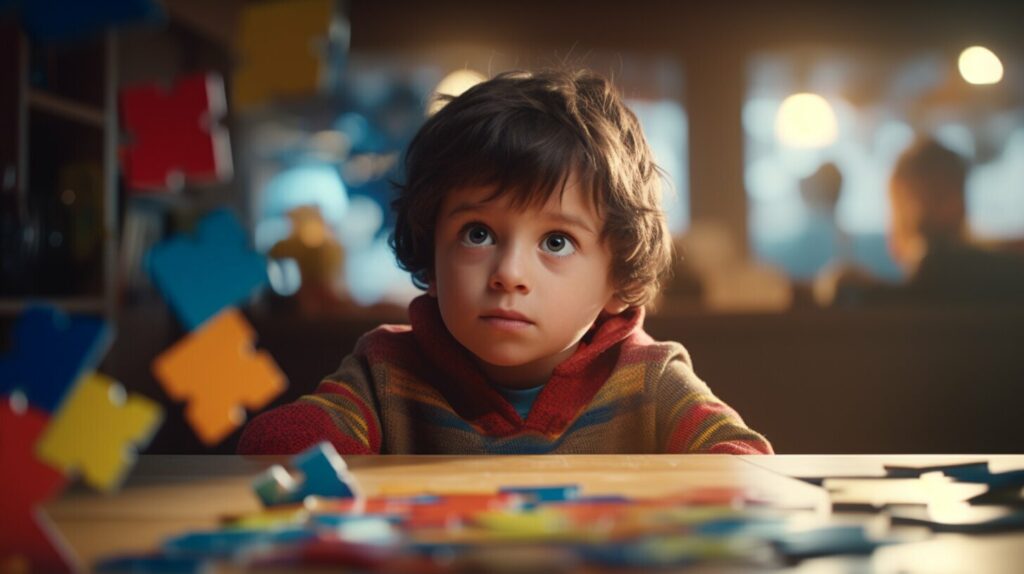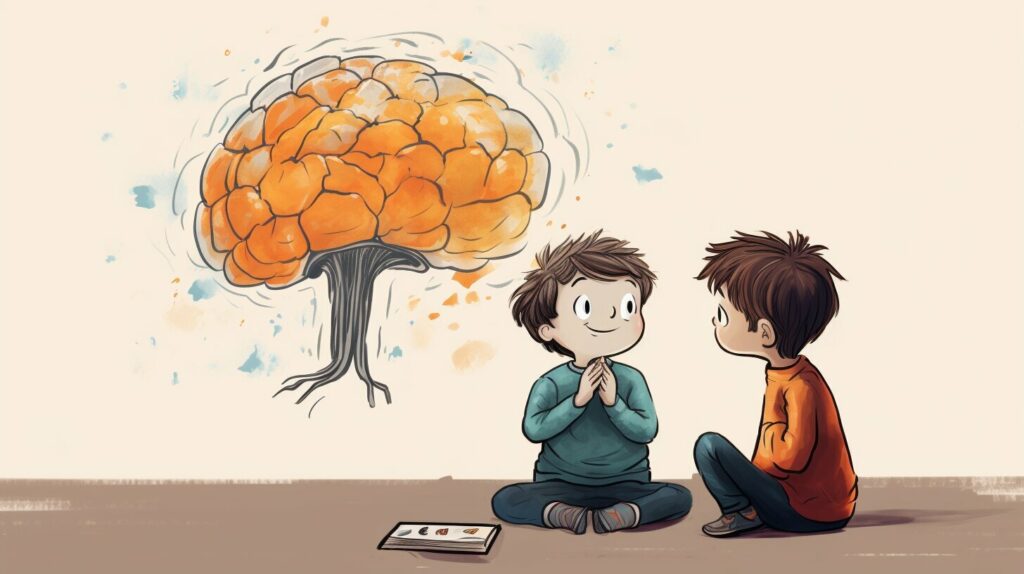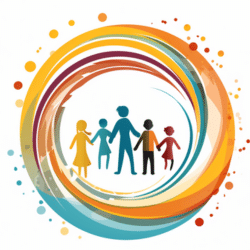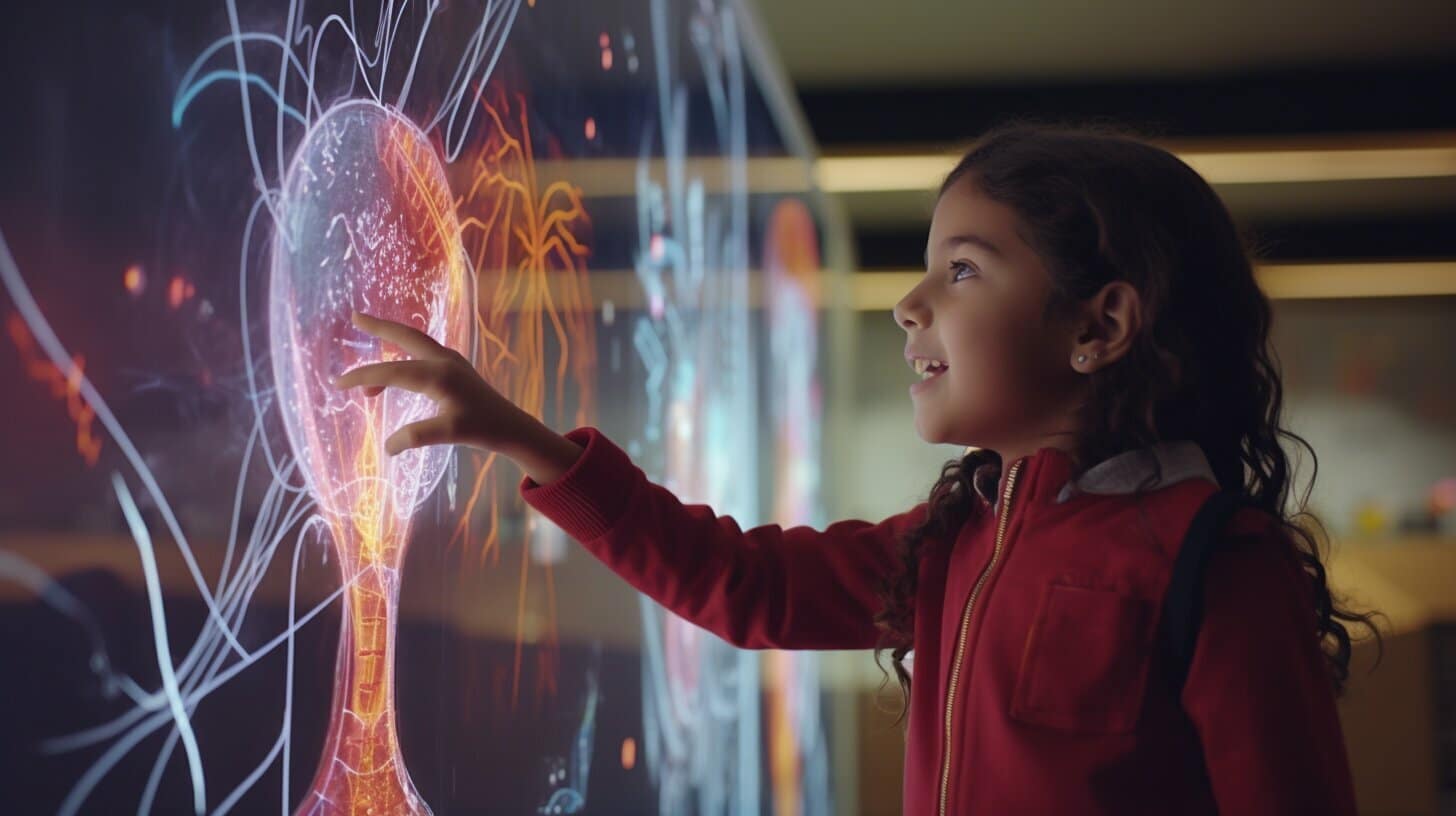When it comes to discussing mental health with children, it’s essential to approach the topic with compassion and understanding. Explaining schizophrenia to a child is no exception.
Schizophrenia is a complex mental health condition that can be difficult for anyone to understand, let alone a child. However, it’s crucial to talk to your child about it to promote empathy and reduce stigma. Knowing how to approach the subject in an age-appropriate manner is key to ensuring your child understands the condition without feeling overwhelmed or scared.
In this article, we will provide guidance on how to explain schizophrenia to a child in a friendly and informative way. We will cover topics such as age-appropriate language, addressing common misconceptions, and creating a supportive environment for discussion. By the end of this article, you will have the tools to approach the topic of schizophrenia with your child confidently.
Key Takeaways:
- Explaining schizophrenia to a child is crucial in promoting empathy and reducing stigma.
- Approaching the subject in an age-appropriate manner is key to ensuring understanding without fear or confusion.
- This article provides guidance on how to address the topic of schizophrenia with your child in a friendly and informative way.
What is Schizophrenia?
If you’re trying to explain schizophrenia to a child, it’s important to start with a simple, straightforward definition. Schizophrenia is a mental illness that affects the way a person thinks, feels, and behaves. People with schizophrenia may experience things that others don’t, like hearing voices or seeing things that aren’t really there. These experiences can be confusing and scary for someone with schizophrenia.
It’s important to emphasize that schizophrenia is a medical condition, just like a physical illness such as diabetes or asthma. While it can be difficult to understand why someone with schizophrenia may act differently or seem “strange,” it’s important to remember that they are still a person who deserves respect and understanding.
Some common symptoms of schizophrenia include:
- Hearing voices or seeing things that aren’t there
- Hallucinations
- Delusions (believing things that aren’t true)
- Disordered thinking or speech
- Difficulty with memory or concentration
- Emotional distance or lack of expression
It’s important to note that not everyone with schizophrenia experiences all of these symptoms, and that the severity of the condition can vary widely from person to person.
Image source: 
Why is it Important to Talk About Schizophrenia?
Teaching children about schizophrenia is important as it promotes understanding, empathy, and reduces stigma. Mental health conditions like schizophrenia are often misunderstood and can create negative stereotypes, which can adversely affect individuals who have the condition. Children who are aware of mental health conditions from an early age are more likely to be more accepting and supportive towards their peers who have schizophrenia.
Open communication within families is essential. Talking about schizophrenia with children helps create an environment where children feel safe to communicate and ask questions. It also helps parents or caregivers identify early signs of mental health problems in their loved ones.
It is also important to note that schizophrenia affects millions of people worldwide, and not talking about it can reinforce the stigma associated with it. By discussing schizophrenia in a child-friendly language, using age-appropriate language, children will have a more accurate understanding of the condition and be less likely to encounter myths or misconceptions.

“Having a mental illness is not a choice or a moral failing, and it certainly doesn’t make a person ‘bad’ or ‘crazy.’” – Jennifer Moyer Darragh, NAMI Director of Criminal Justice and Advocacy
Breaking down the barriers of mental health and promoting open communication with children is an essential step towards creating a world where everyone feels accepted and supported. Talking about schizophrenia with children can help create awareness and understanding and promote positive attitudes towards mental health in general.
Age-Appropriate Approach
When discussing schizophrenia with a child, it is important to tailor the information to their age and cognitive development. Here are some tips for approaching the conversation:
- Young children: Keep the explanation simple and use concrete examples, such as hearing voices or seeing things that aren’t there. Avoid using technical terms or medical jargon. Use stories or drawings to help illustrate your points.
- Older children: Use more advanced vocabulary and ask them what they already know about mental health conditions. Encourage them to ask questions and express their thoughts and feelings. Be honest and transparent, but also emphasize that schizophrenia is treatable and manageable.
Remember, it is important to create a safe and supportive environment for these conversations. Encourage your child to express their feelings and assure them that they are not responsible for someone else’s mental health condition.

Creating a Safe and Supportive Environment
When discussing schizophrenia with a child, it is important to create a safe and supportive environment. Choose a time when your child is relaxed and comfortable, and find a quiet space where you can have a conversation without distractions. Let your child know that they can ask questions and express their thoughts and feelings.
Reassure your child that schizophrenia is not contagious and that having the condition does not make someone a bad person. Explain that people with schizophrenia may have a harder time dealing with their thoughts and feelings, and that they may need extra support and understanding.
It might be helpful to share stories or examples of people with schizophrenia who have been successful, to help your child understand that people with mental health conditions can lead fulfilling lives.
If your child expresses concern about a family member or friend who has schizophrenia, reassure them that the person is receiving appropriate care and encourage them to be kind and supportive.

Remember, talking about schizophrenia can be a difficult topic for both you and your child. Be patient, listen to your child’s concerns, and offer reassurance and love throughout the conversation.
Using Age-Appropriate Language
One of the most crucial aspects of explaining schizophrenia to a child is using language that is suitable for their age and cognitive level. It is essential to avoid using technical jargon or complex terminology that may confuse or intimidate them.
Instead, try to use simple and relatable language that they can understand. For example, you can explain that schizophrenia is a mental health condition that affects the way people think and feel, which can make them see or hear things that aren’t really there.
It is also helpful to use metaphors or analogies to help them grasp the concept better. You can compare schizophrenia to wearing glasses that change the way you see the world or using a broken radio that only picks up static. These comparisons can make the condition more relatable and less frightening to a child.

Tip: If your child has a lot of questions or seems overwhelmed, encourage them to ask questions and provide reassurance. Repeat information if necessary and remind them that they can always come to you for support.
Addressing Common Misconceptions
Children may have encountered common misconceptions or myths surrounding schizophrenia. It is essential to address these and provide accurate information to promote a better understanding of the condition.
“Schizophrenia means having a split personality.”
This is a common misconception about schizophrenia. In reality, people living with schizophrenia may experience a variety of symptoms, including hallucinations, delusions, and disorganized thinking. However, they do not have multiple personalities.
“People with schizophrenia are dangerous.”
This is another common myth. In fact, people living with schizophrenia are more likely to be victims rather than perpetrators of violence. It is crucial to promote empathy and understanding towards those with mental health conditions, including schizophrenia.
By providing accurate information and dispelling myths, we can break down stigma and promote a more accepting and inclusive society.

Encouraging Empathy and Support
Now that your child has a basic understanding of schizophrenia, it’s important to promote empathy and support towards individuals with the condition. By doing so, you can help reduce stigma and encourage kindness towards those who may be struggling.
One way to encourage empathy is by reminding your child that individuals with schizophrenia are still people who deserve respect and understanding. It’s important to avoid making assumptions or using hurtful language that may perpetuate misunderstanding of the condition.
Another way to foster support is by encouraging your child to be a good listener and offer help where they can. You can suggest that they ask questions, validate their peers’ experiences, and offer support in simple ways. For example, they could offer to spend time with their friend or classmate who has schizophrenia, or simply be a good shoulder to lean on when needed.
Remember, promoting empathy and support towards individuals with schizophrenia not only helps those with the condition but can also benefit your child’s own mental health and wellbeing.

“By fostering empathy and support towards individuals with schizophrenia, you can help reduce stigma and encourage kindness towards those who may be struggling.”
Seeking Professional Help
While it is important to provide support and understanding for children who may have a loved one with schizophrenia, it is equally important to seek professional help when necessary. Mental health professionals can provide tailored treatment plans, medication management, and therapies to individuals with the condition.
If you suspect that your child may be experiencing symptoms of schizophrenia or another mental health condition, it is important to seek guidance from a healthcare provider. This can include a primary care physician, psychiatrist, or psychologist. They can provide a thorough evaluation and refer you to a specialist if needed.
It is also important to involve trusted adults in the child’s support system, such as family members, teachers, or counselors. They can provide additional support and resources to help the child and family navigate the challenges associated with schizophrenia.
Remember, seeking professional help does not mean that you or your loved one is weak or incapable. It is a brave step towards managing a complex condition and improving overall mental health and wellbeing.

Conclusion
Explaining schizophrenia to a child can be a daunting task, but it is crucial to promote understanding and reduce stigma surrounding mental health conditions. By approaching the topic in an age-appropriate and compassionate manner, you can help your child develop empathy and support towards individuals with schizophrenia.
Remember to tailor your approach based on your child’s age and cognitive development, using language that is simple and easy to understand. Create a safe and supportive environment for the conversation, and be prepared to address any concerns or questions that may arise.
It is important to dispel any misconceptions or myths surrounding schizophrenia and provide accurate information to promote understanding. Encourage your child to be kind and accepting towards those with the condition, and seek professional help if needed.
Overall, by fostering open communication, empathy, and support, you can help promote a better understanding of mental health conditions from a young age.
Can the Same Approach of Explaining the Devil to a Child be Applied When Explaining Schizophrenia?
When discussing complex topics like schizophrenia, using a simple approach to explain the devil to a child may not be applicable. Schizophrenia is a mental disorder characterized by distorted thinking, hallucinations, and delusions. While explaining the devil may require simplification, explaining schizophrenia would necessitate more detailed information and a deeper understanding of the disorder’s complexities. It’s important to use appropriate language and concepts when explaining such sensitive topics to ensure clarity and understanding.
FAQ
Q: How do I explain schizophrenia to a child in a friendly way?
A: When explaining schizophrenia to a child, it’s important to use age-appropriate language and provide simple explanations. Focus on discussing the symptoms and manifestations of the condition in a relatable and easy-to-understand manner. Emphasize the need for understanding and compassion when talking about mental health with children.
Q: What is schizophrenia?
A: Schizophrenia is a mental illness that affects how a person thinks, feels, and behaves. It can cause hallucinations, delusions, and difficulty distinguishing between what is real and what is not. It’s important to explain to children that schizophrenia is a condition that affects the brain and can be managed with professional help.
Q: Why is it important to talk about schizophrenia with children?
A: It is important to talk about schizophrenia with children to promote understanding and empathy towards individuals with the condition. By discussing mental health openly, we can reduce stigma and create a supportive environment. It also helps children learn about the importance of open communication and seeking professional help when needed.
Q: How can I approach the topic of schizophrenia based on a child’s age?
A: When talking to children about schizophrenia, it’s essential to consider their age and cognitive development. Tailor the information to their level of understanding, ensuring it is neither overwhelming nor oversimplified. Use examples and stories that they can relate to, and encourage them to ask questions and share their feelings.
Q: How can I create a safe and supportive environment for discussing schizophrenia?
A: Creating a safe and supportive environment involves finding the right time and place to have these conversations. Make sure everyone is calm and relaxed, and be prepared to address any concerns or questions that may arise. Encourage open dialogue and let your child know that they can come to you with any further inquiries or worries.
Q: How do I use age-appropriate language when explaining schizophrenia to a child?
A: Using age-appropriate language is crucial in helping children understand schizophrenia. Avoid using complex medical terms and instead, provide simplified explanations. Use vocabulary that they are familiar with and break down concepts into manageable pieces of information. Reassure them that it’s okay to ask questions if they don’t understand something.
Q: What are some common misconceptions about schizophrenia that children may have?
A: Children may have encountered common misconceptions or myths surrounding schizophrenia. It’s important to address these misconceptions by providing accurate information. Explain that schizophrenia is not caused by a character flaw or something the person did. Help them understand that individuals with schizophrenia deserve understanding and support.
Q: How can I encourage empathy and support towards individuals with schizophrenia?
A: Encouraging empathy and support towards individuals with schizophrenia starts with teaching children about the condition and promoting understanding. Encourage kindness, acceptance, and inclusivity. Help children understand that the person with schizophrenia is still the same person they know and care about, and that their condition doesn’t define them.
Q: When should I seek professional help for schizophrenia?
A: While it’s important to provide support, it’s crucial to involve mental health professionals in managing schizophrenia. If you notice significant changes in a person’s thoughts, feelings, or behavior, or if the symptoms of schizophrenia are causing distress or impairment, seek guidance from healthcare providers. Trusted adults, such as parents or teachers, can help facilitate this process.
Q: Conclusion
A: In conclusion, explaining schizophrenia to a child in a friendly and age-appropriate manner is essential for promoting understanding and empathy. By using simple language, creating a safe environment, and addressing common misconceptions, we can help children develop a positive attitude towards mental health. Remember to seek professional help when needed and continue to foster a supportive environment for all.






